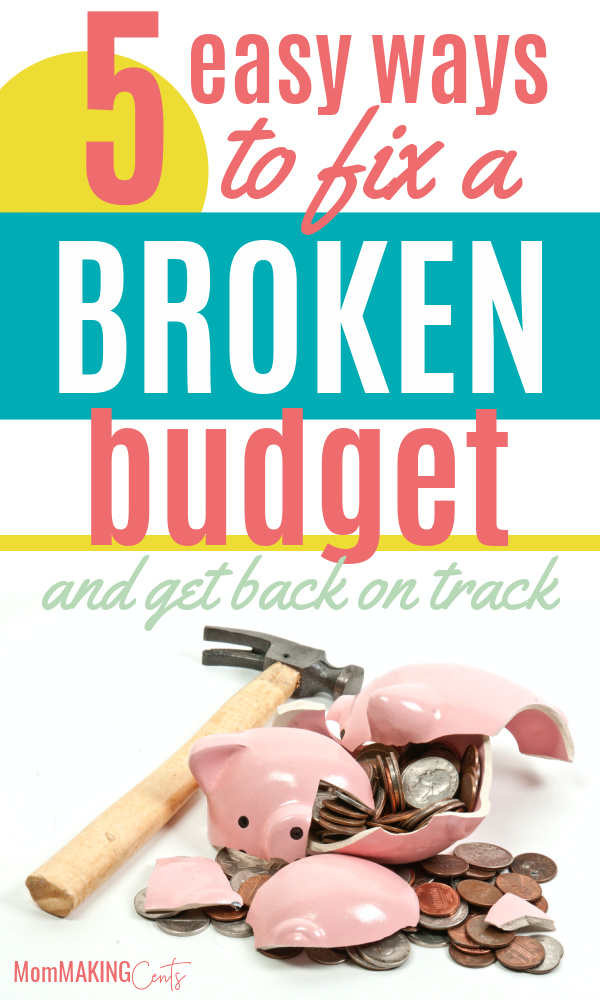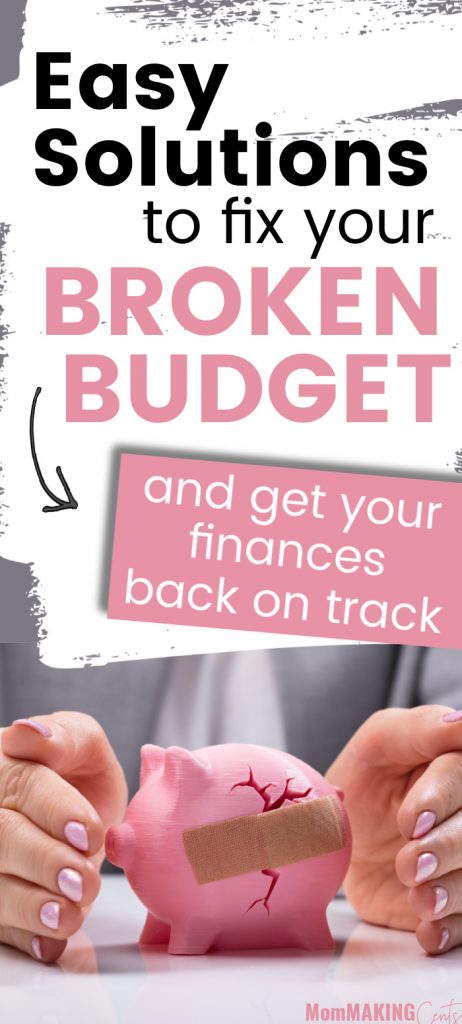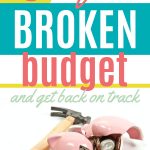Did you blow your budget? Don’t panic! It’s easy to get back on track with your finances with these quick fixes for a broken budget.

How To Fix a Broken Budget
Even the most meticulous budgeters slip up once in a while. But you don’t need to let a broken budget get you down!
I break my budget all the time. Life throws unexpected expenses at me every time I turn around. And even though I try really hard to take all these odds and ends into my budget, sometimes it just works out the way I want it to.
Budgeting can be like a diet. You have a cheat day and totally fall off the wagon. So do you just give up and go back to an unhealthy lifestyle?
NO!
You assess the damage, fix the broken parts, and start over.
Budgeting is no different. Fixing a broken budget really doesn’t have to be that hard, as long as you don’t give up.
Here are some quick fixes for a broken budget that get me back on track every time.
Keep Reading: Budgeting Categories You’re Probably Forgetting About
Get Back On Track When You Break Your Budget
A budget can be blown with unexpected expenses like pricey home or car repairs. But it can also because you overspent or had an impulse purchase.
Travelling is my weakness. When I feel the itch to go somewhere, I do my best to find the money in my budget. But if I can’t, I tend to blow the budget and charge my vacation.
It’s not always smart, but sometimes you gotta live a little, amiright?!?!
1 – Remember your Goals
It can be really easy to get off track with our budget when we forget WHY we set a budget in the first place.
When I start overspending and going over my budget for items I really don’t need, I dig deep for the original reason it was so important for me to pay off my debt and live frugally.
I want to retire early and travel. I don’t want to be working a 9-5 job until I’m too old to do anything. My goal is to retire early enough that I can travel around the United States and enjoy life, working for myself.
So my budget starts taking on a mind of its own, I get back on track by reminding myself of my goals.
I’ll look at Instagram and search places I want to travel, or start pricing out how much I need in retirement to quit my job.
Once I have that focus back in my mind, it’s easy to regroup and get back on track with my budget.
2 – Adjust Your Budget Temporarily
It’s OK to adjust your budget when you need to. It’s not like you have a boss to report to. Your finances are your own.
So if you need to put a pause on the amount of money you put in savings for the next two months, to pay off a costly car repair, then do it.
Or maybe you need to take some funds from entertainment and put it toward your debt. I know I know, it doesn’t sound appealing. But sometimes you gotta do what you gotta do.
3 – Try a Spending Freeze
I love a good spending freeze! (Said no one ever)
Doing a spending freeze can be tough. But sometimes the challenge of them is enough to motivate most to try.
Keep it doable. Start with a week or two, or go for a month if you think you can.
You’ll be surprised how much money you can save up in a month when you stop all unnecessary spending.
And all that money you save up can go a long way in paying off whatever unexpected debt that popped up.
4 – Make Extra Money
There is no better way to pay off debt and fix a broken budget than to make extra money and throw every dime at it.
Making extra can be difficult. Not all of us have the time to work more jobs. Or the skills to come up with money-making ideas.
But if you get creative enough, you can find ways to come up with extra money to pay off your unexpected debt.
You can try these simple ways to make extra money from home that literally anyone can do.
Or you can try coming up with cash in a different way. Perhaps there are some things you can sell around the house? Furniture or clothing (even appliances or old phones) often bring in enough extra cash to pay for unexpected expenses.
5 – Use Your Emergency Fund
Although it’s never ideal to dip into your emergency fund, sometimes you just have to.
I mean, that actually is the point of an emergency fund.
So don’t feel guilty about using your emergency fund to fix a broken budget. Just remember to replenish it over the next couple of months so it’s there when you need it the next time.
Fixing your Broken Budget
Keep in mind it’s normal to break a budget once in a while. I recommend keeping track of the dates you have a broken budget, the amount you went over, and the reasons.
Keeping track of your budgeting fails with a simple notebook will help you to recognize a pattern and see how often it’s happening (and why!) and that really might be the key to stopping you from breaking your budget in the future.
What other ways do you have to fix a broken budget? I’d love to hear your tips in the comments below!
You Might Also Be Interested In:
- How To Create a Budget In 5 Easy Steps
- 15 Items To Cut From Your Budget To Save A Ton Of Money
- How To Use Credit Cards Responsibly
- Secrets To Stop Spending Money You Don’t Have
- How To Live Within Your Means Without Being Deprived

Pin for later!




Leave a Reply